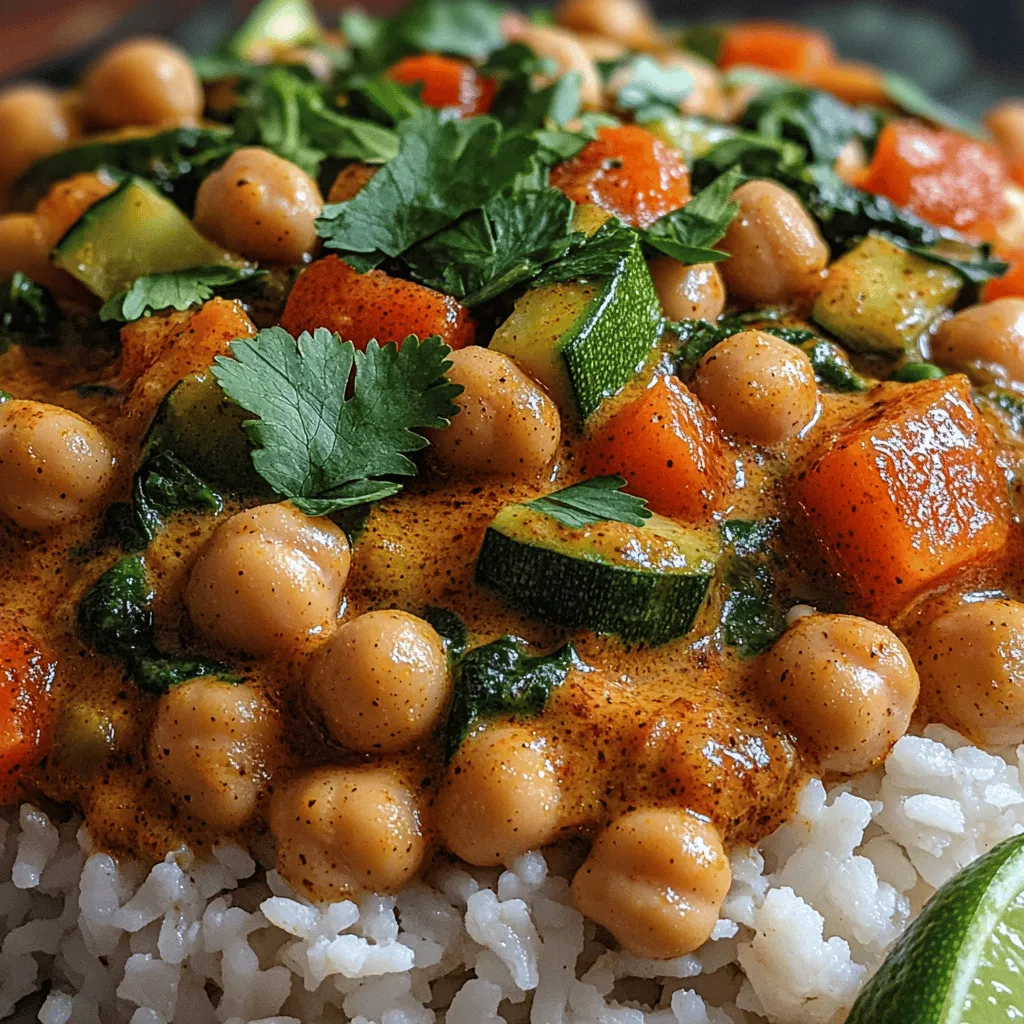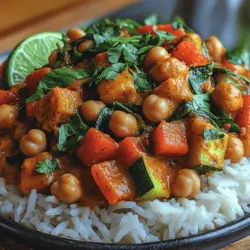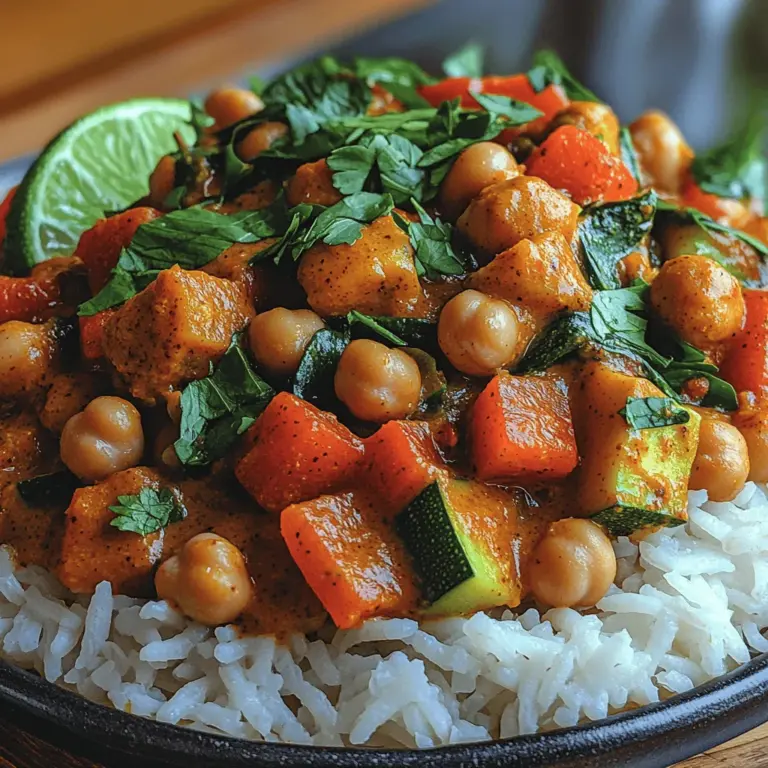Introduction
Explore the vibrant flavors of the tropics with this delightful Tropical Bliss Coconut Curry Chickpea Stew. This recipe brings together the creamy richness of coconut milk, the earthiness of chickpeas, and a medley of colorful vegetables, creating a truly nourishing dish that’s perfect for any occasion. Whether you’re a seasoned chef or a novice in the kitchen, this stew is simple to prepare yet packed with flavor, making it an ideal choice for weeknight dinners or meal prep.
Coconut curry has its roots in various cultures around the globe, particularly in Southeast Asia and the Indian subcontinent. This culinary tradition showcases the versatility of coconut milk, which has been used for centuries in various dishes, imparting a rich and creamy texture that elevates any meal. In this article, we’ll delve into the ingredients, preparation steps, and the cultural background of coconut curry, providing you with a comprehensive guide to creating this tropical delight.
Understanding the Ingredients
Chickpeas: The Heart of the Dish
Chickpeas, also known as garbanzo beans, are the backbone of this stew, providing both substance and nutrition. They are an excellent source of plant-based protein, making them a staple in vegetarian and vegan diets. Chickpeas are rich in dietary fiber, which aids in digestion and promotes feelings of fullness, making your meal more satisfying.
When it comes to choosing chickpeas for this recipe, you have a couple of options: canned or dried. Canned chickpeas offer convenience and a quicker cooking time, while dried chickpeas require soaking and longer cooking times but can provide a firmer texture. If you opt for dried chickpeas, be sure to soak them overnight and cook them until tender before adding them to your stew.
Coconut Milk: Creaminess and Flavor
Coconut milk serves as the luxurious base for this stew, adding creaminess and a subtle sweetness that balances the spices. When selecting coconut milk, you’ll find two main varieties: full-fat and light. Full-fat coconut milk is richer and creamier, ideal for creating a decadent stew, while light coconut milk contains less fat and can be a healthier option if you’re watching your calorie intake.
In cooking, coconut milk not only enhances flavor but also contributes to the overall texture of the dish. Its creamy consistency helps to meld the spices and other ingredients, creating a harmonious blend of flavors that envelops your taste buds.
Aromatics: Building Flavor Foundations
No curry is complete without aromatics, and this dish is no exception. Onions, garlic, and ginger form the flavor foundation of the Tropical Bliss Coconut Curry Chickpea Stew. Onions provide sweetness and depth, while garlic and ginger add a zesty punch that invigorates the palate.
Selecting fresh, high-quality aromatics is crucial for achieving the best flavor. When preparing these ingredients, finely chop the onion to promote even cooking and release their natural sugars. Minced garlic and ginger should be added later in the sautéing process to prevent burning, which can create a bitter taste.
Fresh Vegetables: Color and Nutrition
A variety of fresh vegetables not only adds color and visual appeal to the stew but also enhances its nutritional profile. In this recipe, red bell pepper and zucchini are featured for their sweetness and crunch. Red bell peppers are rich in vitamins A and C, while zucchini adds fiber and hydration to the dish.
Spinach or kale is a great addition to this stew, providing a boost of vitamins and minerals. These leafy greens can be added towards the end of cooking, wilting into the stew and retaining their vibrant color and nutrients. Feel free to experiment with seasonal vegetable substitutions to keep the dish fresh and exciting throughout the year.
Spices and Seasoning: The Essence of Curry
The essence of any curry lies in its spices, and this Tropical Bliss Coconut Curry Chickpea Stew is no exception. A blend of red curry paste, turmeric, and cumin creates a flavor profile that is both aromatic and satisfying. Red curry paste adds heat and depth, while turmeric lends its warm color and anti-inflammatory properties. Cumin provides an earthy base note that complements the other spices.
Understanding the balance of flavors is essential in creating a well-rounded curry. The addition of soy sauce or tamari enhances the umami flavor, rounding out the dish and tying all the ingredients together. Adjust the spice levels to your preference, whether you prefer a milder stew or one with a kick.
Step-by-Step Preparation
Sautéing Aromatics for Depth of Flavor
The first step in creating this delicious stew is to sauté the aromatics. Start by heating a tablespoon of oil in a large pot over medium heat. Once the oil is shimmering, add the chopped onions and sauté until they become translucent and fragrant, usually about 5-7 minutes. This process is crucial as it develops the base flavor for the stew.
Next, add minced garlic and ginger to the pot. Sauté these aromatics for an additional 1-2 minutes, stirring frequently to prevent burning. The aroma that wafts through your kitchen at this stage is simply irresistible and sets the tone for the delightful dish you are about to create.
Incorporating the Curry Paste
Once the aromatics are perfectly sautéed, it’s time to incorporate the red curry paste. Add about 2-3 tablespoons of the paste to the pot, stirring it into the onion, garlic, and ginger mixture. The heat from the pot will help release the flavors of the spices in the curry paste, intensifying their aroma.
Toasting the spices is a crucial technique in curry preparation. As the paste cooks, keep an eye on it to ensure it doesn’t burn. You may notice the colors darken slightly and the fragrance become even more pronounced. If you prefer a spicier stew, feel free to adjust the amount of curry paste according to your heat tolerance.
Adding Vegetables: A Visual Feast
The next step is to add the fresh vegetables to your pot. Start by adding the diced red bell pepper and zucchini. Stirring them into the mixture allows their flavors to meld with the aromatic base you’ve created. Cook the vegetables for a few minutes until they begin to soften, adding texture and a beautiful visual element to your stew.
Once the bell pepper and zucchini are tender, it’s time to incorporate the chickpeas and coconut milk. This combination transforms your sautéed base into a hearty stew, rich in flavor and nutrition. The creamy coconut milk will envelop the vegetables and chickpeas, creating a luscious sauce that is perfect for soaking up with rice or bread.
As you continue to build this dish, remember that cooking is as much about the process as it is about the final result. Enjoy the vibrant colors, enticing aromas, and the anticipation of the delicious Tropical Bliss Coconut Curry Chickpea Stew that is coming together in your kitchen.
Stay tuned for the next part where we will continue with the preparation process and explore more tips for achieving the perfect stew.

Best Practices for Chopping and Preparing Vegetables
When preparing vegetables for the Tropical Bliss Coconut Curry Chickpea Stew, having the right technique can make a significant impact on both the cooking process and the final presentation. Start by selecting fresh produce; vibrant vegetables not only enhance the stew’s flavor but also its nutritional profile.
1. Choosing Your Vegetables: For this stew, bell peppers, carrots, and onions are essential. Opt for firm, glossy bell peppers and crisp, unblemished carrots. A fresh onion should feel heavy for its size and have a papery skin.
2. Chopping Techniques:
– Onions: Peel the onion and cut it in half from the root to the tip. Place the flat side down and make horizontal and vertical cuts before slicing downwards to create even dice.
– Bell Peppers: Cut around the stem to remove the top, then slice the pepper in half. Remove the seeds and white pith, and chop into bite-sized pieces.
– Carrots: Peel the carrots and slice them crosswise into rounds, or cut them into half-moons for a chunkier texture.
3. Consistency: Aim for uniform sizes in all your chopped vegetables. This ensures even cooking and enhances the overall texture of the stew. Smaller pieces cook faster and absorb flavors better, while larger chunks provide a satisfying bite.
Cooking Times and Techniques for Optimal Texture
Cooking times are crucial for achieving the right balance of tenderness and crunch in your vegetables.
– Sautéing: Start with a hot pan and a splash of oil to sauté your onions first. Cook them until they are translucent, about 5 minutes. This step is vital for flavor development as it helps release the natural sugars in the onions.
– Adding Harder Vegetables: After the onions, add the carrots and bell peppers. Cook these for an additional 3-5 minutes until they begin to soften. This technique not only enhances the flavor but also helps to layer the dish with complexity.
– Simmering: Once you’ve added the chickpeas and coconut milk, bring the stew to a gentle simmer. This slow cooking process allows the flavors to meld beautifully, typically taking about 20-30 minutes. Stir occasionally to prevent sticking and ensure everything cooks evenly.
Bringing It All Together: Simmering the Stew
Simmering is the heart of developing rich, layered flavors in your Tropical Bliss Coconut Curry Chickpea Stew.
– Flavor Development: The simmering process allows the spices, coconut milk, and vegetables to interact, creating a harmonious blend of tastes. Aim for a gentle simmer rather than a vigorous boil to prevent the coconut milk from curdling.
– Stirring Techniques: Stir the stew every 5-7 minutes. This not only helps to evenly distribute heat but also prevents the ingredients from settling and potentially burning on the bottom. If adding more liquid, do so gradually to maintain the desired thickness.
Final Touches: Adding Greens and Seasoning
Towards the end of the cooking time, it’s essential to add any leafy greens, such as spinach or kale.
– Timing for Greens: Add them during the last 5 minutes of cooking. This timing ensures they wilt perfectly without losing their vibrant color and nutritional value.
– Balancing Flavors: Before serving, taste the stew and adjust the seasoning. A squeeze of fresh lime juice brightens the flavors, while salt and pepper enhance the overall taste. This step is crucial for achieving a balanced flavor profile.
Serving Suggestions
When it comes to serving your Tropical Bliss Coconut Curry Chickpea Stew, the choice of base can elevate the dish significantly.
The Perfect Base: Choosing Between Jasmine Rice and Quinoa
– Flavor and Texture: Jasmine rice is fragrant and fluffy, making it an excellent companion for the creamy curry. In contrast, quinoa offers a nutty flavor and a slightly chewy texture, adding unique depth to each bite.
– Nutritional Comparisons: Quinoa is a complete protein, making it an exceptional choice for those seeking plant-based protein sources. Jasmine rice, while lower in protein, provides quick energy and is gluten-free. Depending on your dietary needs, either option complements the stew beautifully.
Garnishing for Presentation and Flavor
Presentation can significantly affect the dining experience.
– Fresh Cilantro: Adding fresh cilantro as a garnish not only enhances the visual appeal but also introduces a burst of freshness that complements the coconut and spices perfectly.
– Other Potential Garnishes: Consider adding a sprinkle of red pepper flakes for heat, a dollop of coconut yogurt for creaminess, or sliced green onions for a pop of color and flavor.
The Cultural Significance of Curry Dishes
Curry dishes hold a special place in many cultures, making them not just meals but stories of heritage and tradition.
A Brief History of Coconut Curry
Coconut curry has its origins in Southeast Asia, particularly in countries like Thailand and India, where coconut and spices are staples.
– Origins: The use of coconut milk in curries dates back centuries, allowing for a creamy texture that balances the heat of spices. As curry spread across the globe, it adapted to local ingredients, resulting in the diverse range of curries we enjoy today.
– Evolution of Curry: From its roots in Asia, curry has found its way into many international cuisines, each culture infusing its unique flavors and ingredients, thus contributing to a rich tapestry of culinary history.
The Role of Vegetarian and Vegan Dishes in Contemporary Cuisine
The rise of plant-based diets has led to a new appreciation for vegetarian and vegan dishes.
– Influence on Traditional Recipes: Many traditional recipes have been adapted to cater to plant-based preferences, making dishes like the Tropical Bliss Coconut Curry Chickpea Stew increasingly popular.
– Modern Dietary Preferences: This stew embodies the shift towards health-conscious eating, showcasing how traditional flavors can be reimagined to fit contemporary dietary trends without sacrificing taste or satisfaction.
Nutritional Information
Understanding the nutritional value of your meals can enhance your health journey.
Caloric Breakdown and Health Benefits
Each serving of Tropical Bliss Coconut Curry Chickpea Stew is packed with nutrients.
– Nutritional Content: A typical serving contains approximately 300 calories, rich in protein from chickpeas and healthy fats from coconut milk. The vegetables provide essential vitamins and minerals.
– Health Benefits: The inclusion of chickpeas offers high fiber content, supporting digestive health, while coconut milk contains medium-chain triglycerides (MCTs), known for their potential metabolic benefits.
Dietary Considerations
This stew is naturally gluten-free and vegan, making it accessible to many dietary preferences.
– Lowering Calories and Sodium: To make the stew lighter, consider using light coconut milk and reducing added salt. You can also increase the vegetable ratio for a more filling dish without adding calories.
Conclusion
The Tropical Bliss Coconut Curry Chickpea Stew is a celebration of flavors, cultures, and health. This dish exemplifies how vibrant tropical ingredients can create a comforting and satisfying meal. With its simple preparation and rich textures, it invites everyone to experience the essence of tropical cooking in their own kitchens. Whether enjoyed on a cozy evening or as part of a festive gathering, this stew promises warmth and joy, making it a cherished addition to any culinary repertoire. Embrace the flavors and enjoy the nourishing benefits this delightful stew brings to your table.

